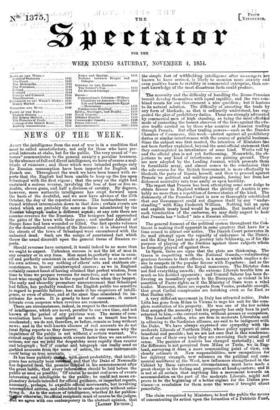NEWS OF THE WEEK.
AGAIN the intelligence from the seat of war is in a- condition that must be called =satisfactory, not only for. those who have per- sonalinterests at stake, but for the.publie. The very sound of "re- verses" communicates to the general anxiety a peculiar keenness. in the absence of full and direct intelligeiic4 we have of course a mul- titude of rumours ; and those which were intended perhaps only for Russian consumption have been imported for English and French use. Throughout the week we have been teased with re- ports that the English had been unable to keep up the fire,upon Sebastopol with the first vigour ; that the army on the right had sustained a serious reverse, involving the loss of four or five re- doubts, eleven guns, and.half a division of cavalry: By degree's, however, • more authentic intelligence has crept forward upon the heels of the doubtful, and we now have advices of the 25th October, the day i of the reported reverse..: The bombardment con- tinued without intermission down to, that date; certain events are stated which are probably the nine_ as those 'adumbrated by the
telegrapk under A.-different asyttat ; at any rate there are counter-reverses for the Russians. The besiegers had approached the gates of the town with their guns ; and -another Admiral of Sinope fame had been wounded or killed. One fact speaks volumes for the demeralited condition of the Russians : it is observed that the streets of the town of Sebastopol were encumbered with the -unburied dead.- Such are the scraps of ascertained, fact which threw the usual diseiedit upon the general tissue of Russian re- ports. Should reverses have 'weaned, it would indeed be no more than
we ought to expect: Unbroken success is null the let of: than in any, country or in anytime. Man must,baperfeetly wise in eolin-' cif and perfectly consistent in action before/he can be so master of his own actions, to say nothing of others' nets, and stubborn cir- curestanees, to insure 'uninterrupted success; as we in England. certainly cannot boast of having attained that perfect wisdoin, from time to time we prepare reverses for Curbelves, and we must be at least wise enough to Eaten to the report of them when they happen. the early and absurdly premature announcement that Sebastopol had fallen, has probably rendered the English public too sensitive in regard to possible failure ; has made it too suspicious of intelli- gence, or even of silence, and at the same time stimulated 'its im- patience for news, It is greedy to hear of successes; it cannot tolerate even suspense when reverses are rumoured.
There. are circumstances, indeed, in respect to the communication of intelligence, whioh are novel, peculiar to our own time, and not known at the period of any previous' war. The means of coin- munication have been multiplied as much as transit has been accelerated; we do not, therefore, as betbre, remain so long without
-news; and in the well-known absence of real accounts we do not ;treat flying reports-as they .deserVe. Thert is one reason why the impatience of the public is not withOnt a certain warrant. We .cannot supply the newailifn with events- faster than we can achieve ' options, nor can we'ilehil the despatches more rapidly than courier and'telegisPli ; 'belt courier and telegraph :eau really send• us garbled accounts frekthe scene of action, the same instruments - bas.beerPaililiely vdthgreat probability, that intelli- gence bring 04 trete, iior.4400.
gem% has lietually—xicu that the Duke of Neiveastle
has depwed:**;theAnzoniiseTnAkOd in his announcement after the great hattle,'/that 'every inforniation shOuld-belaid before the -public as soon as piisifilde. Of Odufie: e meant real news of events interesting and intelligible to the pub *c ; he amildluot_mean ex-. planatory details intended for official guidance, or imperfect reports, .necessary, perhaps', to expedite offimal:movements; brit involving uncompleted actions, and calculated to create anxiety without satis- fying it. As to the nature of intelligence, whether ,fit fur publiea-
. t r otherwise, itsoifieial recipients must of course be thejudges. ut we agree with one contemporary in the abstract opinion, that the simple faot of withholding intelligence after messengers, lire , known to have arrived, is likely to occasion more anxiety and even positive harm to stability in commercial enterprise, than cor- rect knowledge Of the most disastrous facts could produce.
























